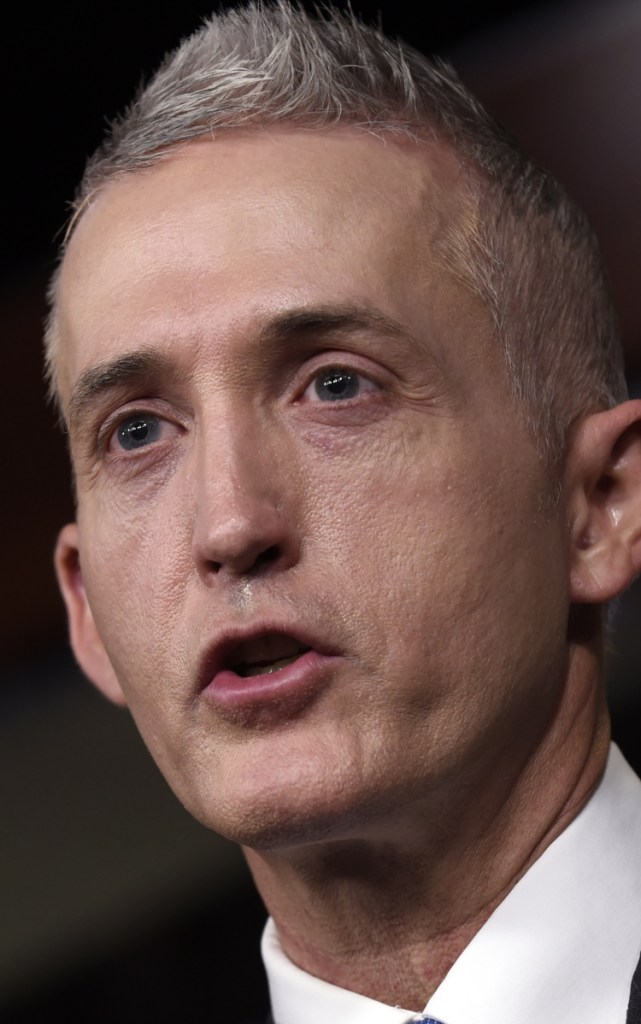WASHINGTON — A fierce partisan battle over the Justice Department and its role in the Russia investigation moves into its second week Monday as Democrats try to persuade the House Intelligence Committee to release a 10-page rebuttal to a controversial Republican memo alleging surveillance abuse.
The panel’s top Democrat, Rep. Adam B. Schiff of California, is expected to offer a motion to release his party’s response to the Republican document during a committee meeting scheduled for Monday at 5 p.m. It was not immediately clear whether Republicans would join Democrats in voting for the document’s release, as some members of the Republican Party have expressed concerns about its contents.
Speaking Sunday on ABC-TV, Schiff called the Republican memo a “political hit job on the FBI in service of the president.”
“The goal here really isn’t to find out the answers from the FBI. The goal here is to undermine the FBI, discredit the FBI, discredit the (special counsel) investigation, do the president’s bidding,” Schiff told “This Week.”
Democrats spent the weekend pushing back against the claim by President Trump and some Republicans that corruption has poisoned the investigation led by special counsel Robert Mueller III into possible coordination between Trump associates and the Kremlin during the 2016 election. Democrats and some Republicans worry that this view, buttressed by the Republican memo, will lead Trump to fire Mueller or Deputy Attorney General Rod Rosenstein, who oversees the Russia probe.
Calling on Trump not to interfere in Mueller’s investigation, four Republican members of the House Intelligence Committee dismissed on Sunday the idea that the memo’s criticism of how the FBI handled certain surveillance applications undermines the special counsel’s work. Reps. Trey Gowdy of South Carolina, Chris Stewart of Utah, Will Hurd of Texas and Brad Wenstrup of Ohio represented the committee on Sunday talk shows.
Gowdy, who helped draft the memo, said Trump should not fire Rosenstein and rejected the idea that the document has bearing on the investigation.
“I actually don’t think it has any impact on the Russia probe,” Gowdy, who also chairs the House Oversight Committee, said on CBS’ “Face the Nation.”
Stewart, arguing that the two are “very separate” issues, said Mueller should be allowed to finish his work. “This memo, frankly, has nothing at all to do with the special counsel,” he told “Fox News Sunday.”
The four Republicans walked a careful line on the Republican document, which alleges that the Justice Department abused its powers by obtaining a warrant for surveillance of former Trump campaign adviser Carter Page using information from a source who was biased against Trump. Their comments echoed those of Speaker Paul Ryan, R-Wis., who supported the memo’s release but insists its findings do not impugn Mueller or Rosenstein.
House Intelligence Committee Chairman Devin Nunes, R-Calif., whose actions have been at the center of the debate over the memo, did not participate in interviews Sunday.
It remained unclear Sunday whether Trump would use the document as a pretext to fire senior Justice Department officials, a decision that could trigger a constitutional crisis, according to Democrats. Trump had advocated the memo’s release, telling advisers it could help him, in part by undercutting Mueller’s investigation and opening the door to firings.
Trump tweeted Sunday that while “the Russian Witch Hunt goes on and on,” the Republican memo “totally vindicates” him.
“Their (sic) was no Collusion and there was no Obstruction (the word now used because, after one year of looking endlessly and finding NOTHING, collusion is dead). This is an American disgrace!” he wrote from Florida, where he spent the weekend.
The four-page Republican memo accused current and former senior Justice Department officials of omitting key facts about former British intelligence officer Christopher Steele, the source of some of their information, in applications to carry out surveillance on Page. Steele wrote the now-infamous dossier alleging ties between Trump and Kremlin officials; his research was paid for by Hillary Clinton’s campaign and the Democratic National Committee.
Copy the Story LinkSend questions/comments to the editors.



Success. Please wait for the page to reload. If the page does not reload within 5 seconds, please refresh the page.
Enter your email and password to access comments.
Hi, to comment on stories you must . This profile is in addition to your subscription and website login.
Already have a commenting profile? .
Invalid username/password.
Please check your email to confirm and complete your registration.
Only subscribers are eligible to post comments. Please subscribe or login first for digital access. Here’s why.
Use the form below to reset your password. When you've submitted your account email, we will send an email with a reset code.